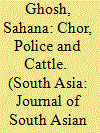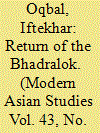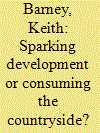| Srl | Item |
| 1 |
ID:
169998


|
|
|
|
|
| Summary/Abstract |
India’s border with Bangladesh figures in the Indian national imagination as a unifying construct for multiple anxieties from illegal immigration to cattle smuggling, thus garnering public support for increased border security. What does a view from the lived and messy realities of the borderlands offer when we shift our focus from the fetish of the borderline as a political and religious marker of difference? This essay tracks the binary of legal–illegal through which cattle in the borderlands are framed, showing how bovines move across different terrains of the agrarian, the sacrificial and everyday cross-border trade in the borderlands and so resist this binary.
|
|
|
|
|
|
|
|
|
|
|
|
|
|
|
|
| 2 |
ID:
108322


|
|
|
| 3 |
ID:
091386


|
|
|
|
|
| Publication |
2009.
|
| Summary/Abstract |
Since the late 1970s, historical studies of colonial Bengal have been dominated by the recurrent theme of the 'return of the peasant', generally set against the previously predominant notion that British-created landlords were omnipotent agents of agrarian relations. Although the new historiography restores agency to the peasant, it seeks to attribute the agrarian decline in the late colonial Eastern Bengal, roughly Bangladesh, to the 'rich peasant'. It is argued that the rich peasant wielded hegemonic authority on their poor fellow co-religionists by forging a 'communal bond', while exploiting them from within. Such development is often considered linked to the separatist idea that offered a 'peasant utopia' in the form of Pakistan against perceived Hindu domination. This article, while not altogether denying the role of the rich peasant, argues that the bhadralok, or the non-cultivating middle-class gentry, were far more powerful as a catalyst in agrarian relations in Eastern Bengal than is conceded in contemporary historical debates. In so arguing, this article re-examines the post-structuralist turn that appeared to replace the classical Marxist paradigm of class by that of culture and consciousness.
|
|
|
|
|
|
|
|
|
|
|
|
|
|
|
|
| 4 |
ID:
147458


|
|
|
|
|
| Summary/Abstract |
One of the unexpected outcomes of increased regional integration in southern Laos has been a boom in household production and roadside sale of wood charcoal. This paper develops an ethnographically informed analysis of charcoal as a socially embedded market, providing insights into the sociopolitical relations of access, legal and extra-legal regulations, and the distribution of rents that characterise this trade. Contrary to some assumptions about charcoal as a necessarily exploitative commodity, this paper points to some of the advantageous income smoothing opportunities that charcoal presents for many rural Lao households and detail the complex ways in which charcoal production can relate to forest sustainability and degradation. The paper elaborates a perspective of entrepreneurial Lao charcoal communities, energetically utilising locally available natural resources, for direct cash income. Charcoal production networks also connect everyday household livelihoods in Laos to large-scale extractive industry, in ways that have been arguably underemphasised previously. At the same time, the charcoal trade highlights the structural limits to notions of smallholder agency and local participation in commodified market relations, within broader political-economic contexts decidedly shaped through uneven development, and accumulation through dispossession.
|
|
|
|
|
|
|
|
|
|
|
|
|
|
|
|